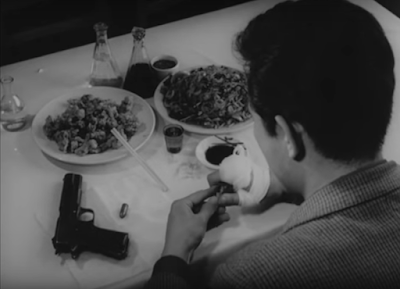Top 12 Korean films of all time
1. Aimless Bullet (1961, Yu Hyun-mok)
2. The Housemaid (1960, Kim Ki-young)
A remarkable film which long held the #1 Korean film in my all time Korean film list. A precursor to Parasite in its examination of the rich-poor divide sparkled with a few jaw-dropping moments.
3. Right now, Wrong then (2015, Hong Sang-soo)
Love and relationships are two common elements found in Hong Sang-soo’s films with food and alcohol being vital to his film’s flow. Characters often gather at a social gathering where lots of food and alcohol is to be found. Alcohol is a key ingredient in his films, particularly the drink of soju which serves as lubricant in allowing the character’s true feelings to be revealed in a natural manner. In his last few films, Hong Sang-soo has used repetition as a powerful device. He has either shown the same event from different perspectives or repeated the same segment with slight variations. All these elements are found in Right Now, Wrong Then which is divided into 2 films, shown from different perspectives and with slight variations. Each film has its own title with the first film called ‘Right Then, Wrong Now’ while the second film is ‘Right Now, Wrong Then’. The alternate titles and the unfolding of events allow audience to select which film they prefer, and in a way, the audience selection also shows the manner in which they prefer to live their own lives.
4. Burning (2018, Lee Chang-dong)
Burning, Lee Chang-dong’s cinematic return after a gap of 8 years, smartly transforms a Haruki Murakami short story into a seductive thriller that lingers in the memory long after the credits.
5. Memories of Murder (2003, Bong Joon-ho)
Gripping thriller which keeps us guessing and tries to be as objective as possible without diving into contrived situations. The ending is unlike any other ever shown in a Hollywood serial killer flick which is what makes this an excellent movie.
6. Parasite (2019, Bong Joon-ho)
Perfectly blends genre elements with socioeconomic examination of a society.
7. Sympathy for Mr. Vengeance (2002, Park Chan-wook)
Takes time to develop its characters and outline the story before plunging into a series of cuts and stabs to end on a bloody note. This was the first Korean film I saw at a midnight film festival screening and it led to an exciting discovery of tracking down as many Korean films as I could.
8. Breathless (2008, Yang Ik-joon)
Yang Ik-joon’s stellar film shows how a cycle of violence can continue beyond generations and that kids who witness violence in their youth can grow up and re-enact those same episodes onto others.
9. The King and the Clown (2005, Lee Joon-ik)
This was a surprise box-office hit upon its 2005 release so much so that it was the biggest box office movie in Korean history until The Host came along. A simple story with no big budget based on a stage play beat out all the big named commercial films! The story is set in 16th Century Korea where two street performers undertake a risky game to make some money. They decide to lampoon the king and his mistress. Such a thing was never done before but it pays off, initially at least among the common folk. However, the king is not amused and wants to punish the street troupe. The lead person asks for one chance – if the king laughs, the troupe be spared. Well the king does laugh, a little at first and a lot over time as he makes the troupe perform only privately for royalty. Such a thing does not go down well with the ministers but the king does not care as he seems to be pre-occupied with a crush on one of the performers. Excellent performances all around!
10. A Dirty Carnival (2006, Ha Yu)
A Dirty Carnival breathes new life into the over-worked gangster sub-genre by focussing more on the characters and their relationships.
11. The Day He Arrives (2011, Hong Sang-soo)
The Day He Arrives is vintage Hong Sang-soo and features what one would expect from his films: filmmaker turned professor returning to his hometown, an ex-love, plenty of drinking with friends/strangers. Conversations and confessions flow as effortlessly as the alcohol and naturally people pour their hearts out. Even though there are familiar elements to his previous films, The Day He Arrives is still a wonderfully crafted feature that is shot in black and white, which lends a poetic beauty to the snowy streets.
12. Spring, Summer, Autumn, Winter..and Spring (2003, Kim Ki-duk)
After Park Chan-wook, it was the cinema of Kim Ki-duk that became my window into Korean cinema in the early 2000s. This was the first of his films that I saw and it proved to be a contemplative experience. Broken into 5 segments as per the title, this film is a visually meditative film that evokes multiple emotions including awe and sadness.




